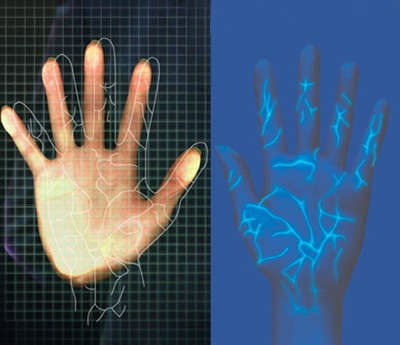Passwords for online banking, social networks and email could be replaced with the wave of a hand if prototype technology developed by Intel makes it to tablets and laptops.
Aiming to do away with the need to remember passwords for growing numbers of online services, Intel researchers have put together a tablet with new software and a biometric sensor that recognizes the unique patterns of veins on a person's palm.
"The problem with passwords -- we use too many of them, their rules are complex, and they differ for different websites," Sridhar Iyengar, director of security research at Intel Labs, said at the annual Intel Developer Forum in San Francisco on Thursday. "There is a way out of it, and biometrics is an option."
Iyengar demonstrated the technology, quickly waving his hand in front of a tablet but not touching it. Once the tablet recognizes a user, it can securely communicate that person's identity to banks, social networks and other services where the person has accounts, he said.
Making laptops, tablets and smartphones responsible for identifying users would take that requirement away from individual websites and do away with the need to individually enter passwords into each of them, Iyengar said. "We plan to work with service providers to take full advantage of this," he said.
Rattner also showed prototype technology to improve cell-phone base stations and to efficiently and wirelessly connect devices such as printers, tablets and monitors throughout the home. He debuted a prototype microchip with wifi technology made with digital circuitry instead of analog, a development that has the potential to lead to major improvements in performance and efficiency.
Aiming to do away with the need to remember passwords for growing numbers of online services, Intel researchers have put together a tablet with new software and a biometric sensor that recognizes the unique patterns of veins on a person's palm.
"The problem with passwords -- we use too many of them, their rules are complex, and they differ for different websites," Sridhar Iyengar, director of security research at Intel Labs, said at the annual Intel Developer Forum in San Francisco on Thursday. "There is a way out of it, and biometrics is an option."
Iyengar demonstrated the technology, quickly waving his hand in front of a tablet but not touching it. Once the tablet recognizes a user, it can securely communicate that person's identity to banks, social networks and other services where the person has accounts, he said.
Making laptops, tablets and smartphones responsible for identifying users would take that requirement away from individual websites and do away with the need to individually enter passwords into each of them, Iyengar said. "We plan to work with service providers to take full advantage of this," he said.
Rattner also showed prototype technology to improve cell-phone base stations and to efficiently and wirelessly connect devices such as printers, tablets and monitors throughout the home. He debuted a prototype microchip with wifi technology made with digital circuitry instead of analog, a development that has the potential to lead to major improvements in performance and efficiency.












